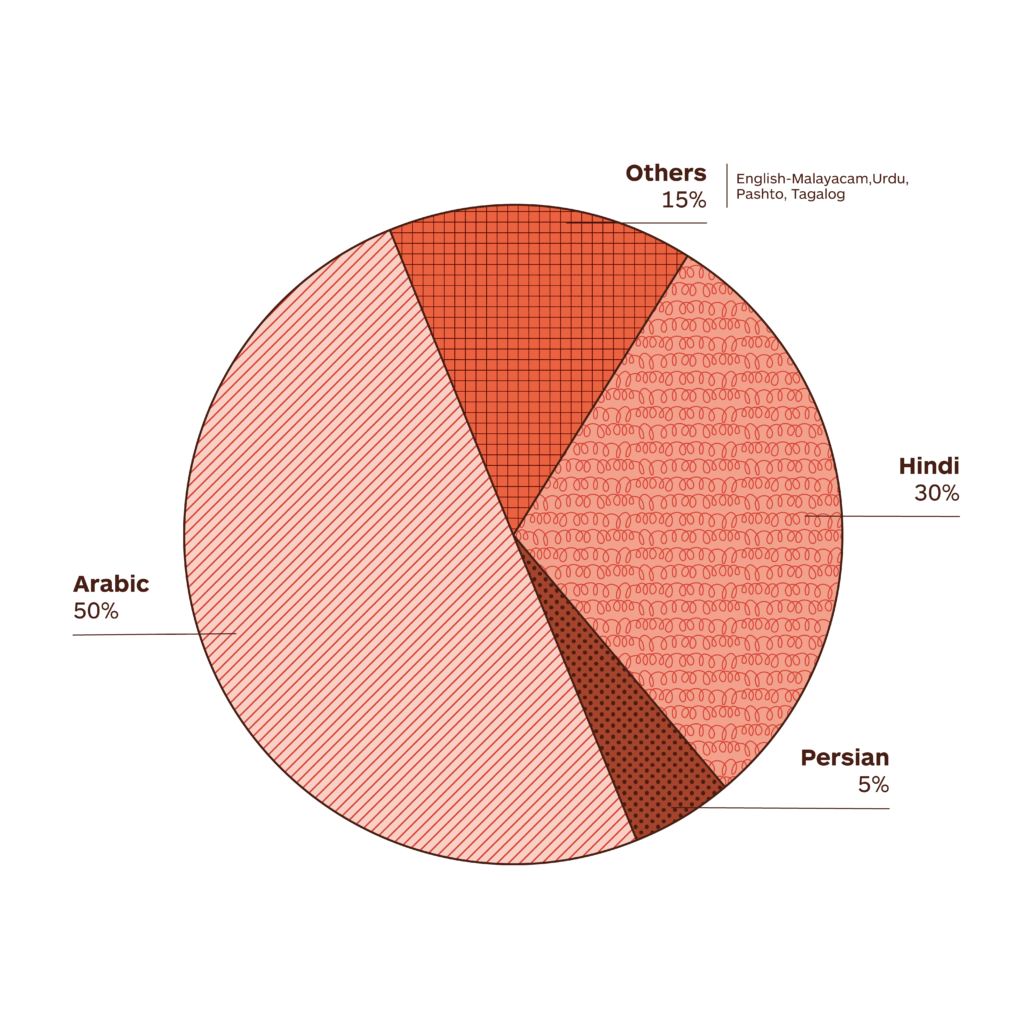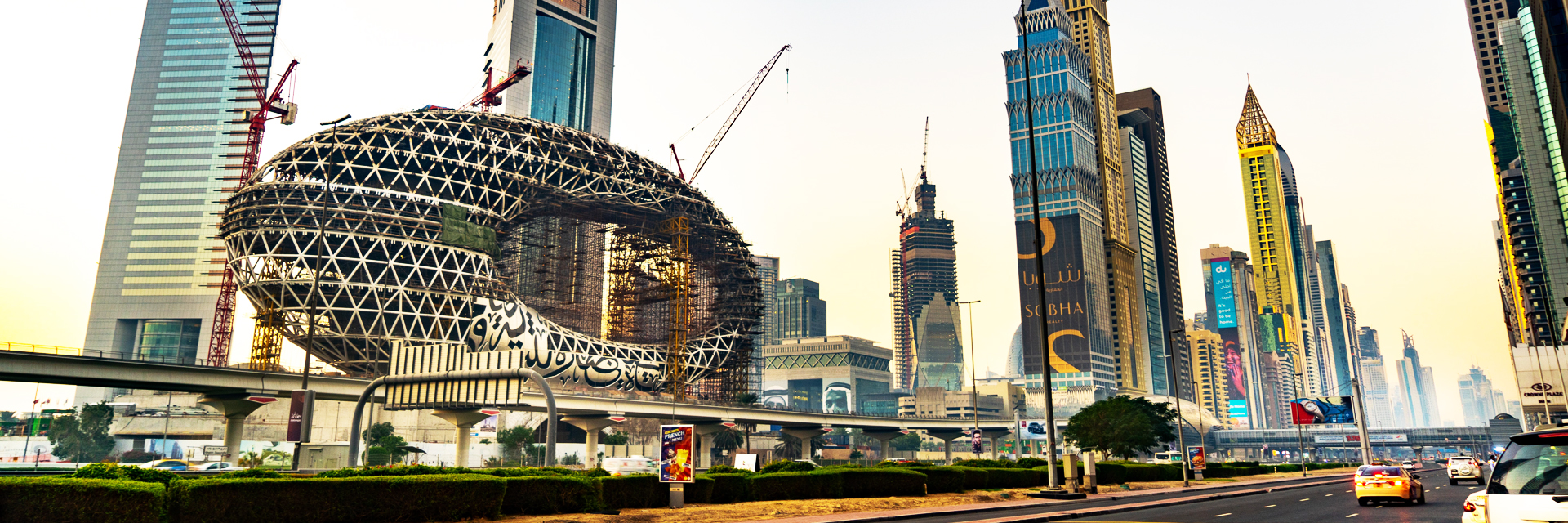Asia
To which language should you translate to localize in the U.A.E.?
What we know from our community
“The UAE speaks Arabic. Modern Standard Arabic, known as “Fus’ha”, it is taught in schools and used in writing. However, the spoken dialect, Gulf Arabic, is different. For example, the pronoun yours is “K.” But Emiratis pronounce it “CH” (Your house: “Baytak” becomes “Baytach”). People in the Gulf also tend to pronounce J as Y and Q as G.
Moreover, the Emirati dialect has borrowed many words from other languages like Farsi, Hindi, and Urdu; this fusion often makes it impossible to understand for someone who speaks the standard Arabic or Levantine dialect (Lebanon, Syria, etc.). So, if you are a non-native speaker who spent years studying Arabic but can’t grasp a conversation in Emirati, don’t despair. It’s not you, and you’re not alone!”
LANGUAGE INSIGHT
Main language
Arabic (42%; 4.61 mln)
Actual languages
Arabic (42%; 4.61 mln), English (7%; 768 k), Tagalog (5.8%; 636 k), Hindi (3%; 329 k), Urdu (1.2%; 131 k), Bengali (1%; 109 k), other (40%; 4.39 mln)
What the top 150 best localized websites in the world do in the United States
(Top 150 websites listed in the Global by Design ranking – published annually by Byte Level Research, this report provides a list of globally localized websites, showcasing best practices and emerging trends in their globalization)
- 63/150 localize by translating into Arabic
- 2/150 localize by translating into Arabic, Urdu, Hindi and Bengali
- 1/150 localizes by translating into Arabic, Urdu, and Hindi
- 1/150 localizes by translating into both Arabic and Urdu
- 1/150 localizes by translating into Arabic, Spanish, French, German and Italian
- 1/150 localizes by translating into Arabic, Spanish, French, German, Italian, Portuguese, Simplified Chinese, Traditional Chinese, Japanese, Czech, Hungarian, Nederland, Polish and Swedish
- 1/150 localizes by translating into Arabic, Spanish, French, German, Italian, Portuguese, Russian, Simplified Chinese, Traditional Chinese, Japanese, Hungarian, Polish, Bahasa Indonesia, Romanian, Thai, Turkish and Ukrainian
- 1/150 localizes by translating into Spanish, French, German, Italian, Portuguese, Russian, Simplified Chinese, Traditional Chinese, Japanese and Korean
- 1/150 localizes by translating into both Spanish and French
-
3M
-
ABB
-
Accenture
-
Adidas
-
Adobe
-
Airbnb
-
Aldi
-
Amazon
-
American Airlines
-
American Express
-
Apple
-
Audi
-
Autodesk
-
Avis
-
Bayer
-
BMW
-
Booking.com
-
Bosch
-
British Airways
-
Bumble
-
Burberry
-
BYD
-
Canon
-
Capgemini
-
Cartier
-
Caterpillar
-
Chevrolet
-
Cisco Systems
-
Citibank
-
Coca-Cola
-
Costco
-
Dell
-
Deloitte
-
Delta
-
DHL
-
Disney+
-
Dyson
-
eBay
-
Eli Lilly
-
Emirates
-
Ernst & Young
-
Facebook
-
FedEx
-
Ford
-
Four Seasons
-
Fujifilm
-
GE
-
Gillette
-
GoDaddy
-
Google
-
Gucci
-
Haier
-
Heineken
-
Hermès
-
Hertz
-
Hilton
-
Hisense
-
Hitachi
-
Honda
-
Hotels.com
-
HP
-
HP Enterprise
-
HSBC
-
Huawei
-
Hyatt
-
Hyundai
-
IBM
-
IKEA
-
Intel
-
InterContinental Hotels
-
J&J
-
Jack Daniel's
-
Jehovah’s Witnesses
-
John Deere
-
Kellogg's
-
Kia
-
KPMG
-
L'Oréal
-
Land Rover
-
LEGO
-
Lenovo
-
Lexus
-
LG
-
Louis Vuitton
-
Lululemon
-
LUSH
-
Marriott
-
MasterCard
-
McDonald's
-
Mercedes-Benz
-
Merck
-
Microsoft
-
Mitsubishi Electric
-
Nestlé
-
Netflix
-
Nike
-
Nikon
-
Nintendo
-
Nio
-
Nissan
-
NIVEA
-
Oracle
-
Pampers
-
Panasonic
-
PayPal
-
Pepsi
-
Pfizer
-
Philips
-
Pitney Bowes
-
Porsche
-
Procter & Gamble
-
PWC
-
Revolut
-
Rolex
-
Royal Caribbean
-
Salesforce
-
Samsung
-
Sanofi
-
SAP
-
Sephora
-
Shopify
-
Siemens
-
Sony
-
Spotify
-
Starbucks
-
Steelcase
-
Stripe
-
Subaru
-
Tesla
-
The Church of Jesus Christ of Latter-day Saints
-
Tiffany
-
Tinder
-
Toshiba
-
Toyota
-
TripAdvisor
-
Uber
-
United Airlines
-
UPS
-
Visa
-
Volkswagen
-
Volvo Cars
-
Vrbo
-
Walmart
-
Western Union
-
Wikipedia
-
Wise
-
WordPress
-
Workday
-
Xerox
-
Xiaomi (Mi)
-
Zara
-
Zoom
If you need others information, below you can find a selection of economic/social/cultural data
Overview
Language
Official language
Arabic (42%)
Other languages
English (7%), Tagalog (5.8%), Hindi (3%), Urdu (1.2%), Bengali (1%), other (40%)
T-index
0.43%
T-Index ranks countries according to their potential for online sales.
English
Low proficiency (EF) – 72 of 123 countries/regions in the world- 3/13 position in the Middle East.
Demography
Capital: Abu Dhabi
Currency: United Arab Emirates Dirham
Population: 10.98M
Population density: 148/km2
Economy
GDP: 552.32 billion USD (2024)
GDP per capita: 50,273.5 USD (2024)
Exports: $367 billion (2023)
Statistics
Internet users: 99% penetration, 11.3 million.
Unemployment rate: 1.9% (2024)
Urbanisation: 86% (2024)
Literacy: 99% (2024)
Conventions
Numbering system
Arabic numerals are not used.
Date format: dd-mm- yyyy
Time: 24h time system
Country code: 00971
Language data sources: Worldatlas/Britannica//EF/Wikipedia; Demography data sources: IMF/Worldometers; Conventions data source: Wikipedia; Economy data sources: WTO/OEC/CIA/Esomar/Datareportal; Statistics data sources: Datareportal/WorldBank/UN/UNESCO/CEIC/IMF/Culturalatlas/Commisceoglobal
Facts and data
Economy
Imports
$378 billion (2023). Gold ($70.1B), Telephones ($36.6B), Cars ($23.4B), Refined Petroleum ($20.1B), and Diamonds ($16.1B), importing mostly from China ($71.7B), India ($31.4B), United States ($25.6B), Saudi Arabia ($12.6B), and Japan ($12.2B).
In 2023, United Arab Emirates was the world’s largest importer of Tug Boats ($1.06B), Used Clothing ($242M), Pitch Coke ($223M), and Bitumen and asphalt ($140M).
Financial inclusion factors (over 15 years of age)
• 84.6% have an account with a financial institution
• 26.8% have a credit card
• 13.3% have a mobile money account
• 60% make online purchases
Ease of doing business
Very easy to conduct business (rated 80.9 out of 100) 1st out of 20 Northern African and Middle Eastern countries, 16th out of 190 countries worldwide (2023, World Bank).
Exports
$367 billion (2023). Crude Petroleum ($99.4B), Refined Petroleum ($51.3B), Gold ($47B), Telephones ($16.2B), and Petroleum Gas ($13.2B). exporting mostly to China ($41.8B), India ($38.1B), Japan ($37.4B), Iraq ($22.6B), and Saudi Arabia ($18B).
In 2023, United Arab Emirates was the world’s largest exporter of Sulphur ($826M), and Limestone ($691M).
Economic freedom
‘Mostly free’ (rated 71.6 out of 100) ranked 1st out of 14 Middle Eastern countries ranked 23rd out of 184 countries worldwide (2024, Heritage Foundation and Wall Street Journal).
Global Innovation Index
Ranked 3rd out of 18 Northern African and
Western Asian countries, 32nd out of 132 worldwide.
The Global Innovation Index captures the innovation
ecosystem performance of 132 economies and tracks the most recent global innovation trends.
Economy data sources: WTO/OEC/CIA/Esomar/Datareportal
Service Imports (2015)
Service Exports (2015)
Source: OEC
Trade balance of goods from 2014 to 2024
Source: Statista
Historical Data Trade Imports
The following section uses historical trade data imports from partners of U.A.E.
Historical Data Trade Exports
The following section uses historical trade data exports from partners of U.A.E.
Source: OEC
The Top Export Opportunities for U.A.E. by Relatedness
Relatedness measures the distance between a country's current exports and each product by showing only products that U.A.E. is not specialized in.
U.A.E.'s Most Complex Exports
The Product Complexity Index (PCI) measures the knowledge intensity of a product by considering the knowledge intensity of its exporters.
Source: OEC
Time required to start a business in United Arab Emirates from 2009 to 2018
Source: InfoDev
Foreign direct investment, net inflows (% of GDP)
Source: WorldBank

T-index
Reach most of the online purchasing power
T-Index ranks countries according to their potential for online sales. It estimates the market share of each country in relation to global e-commerce.
Try it nowMedia
Media language Arabic
Information channels
The UAE is a regional and international centre for TV and media, alongside Egypt and Lebanon. Dubai Media City and twofour54, Abu Dhabi’s media zone, were set up to attract industry players. The UAE is home to major pan-Arab broadcasters, including Saudi-owned MBC and OSN. Sky News Arabia operates from Abu Dhabi. The presence of millions of expatriates adds variety to the media scene, which caters for Arab, English-speaking and South Asian audiences. Most domestic UAE media outlets are run by state-owned Abu Dhabi Media and Dubai Media Incorporated.
Self – Censorship
The constitution provides for freedom of speech but there is strong regulatory and political control of media content. Publications must be licensed and follow official guidelines on reporting. Foreign publications are censored before distribution. Journalists tend to practise self-censorship. Extensive, automated filtering is in place at ISP level. Targeted content includes opposition politics and religion. Legislation bans the dissemination of online material that can threaten “public order” and envisages prison terms for those who “deride or damage” the reputation of the state and “display contempt” for religion.
The press
Al-Bayan – Arabic daily, Dubai government-owned
Gulf News – Dubai-based, English-language
Khaleej Times – private, Dubai-based daily, English-language
Emirates 24/7 – English-language online publication
The National – Abu Dhabi-based English-language daily
Television
Dubai Media Incorporated (DMI) – Dubai government-owned pan-Arab broadcaster, operates Dubai TV, Dubai One
Abu Dhabi TV – pan-Arab broadcaster
Ajman TV
Sharjah TV
MBC – Dubai-based pan-Arab broadcaster
OSN – Dubai-based pan-Arab multichannel platform
Al-Arabiya – pan-Arab news channel operated by MBC, English-language web pages
Sky News Arabia – Abu Dhabi-based pan-Arab network
Radio
Abu Dhabi Media Company – operates Abu Dhabi FM and other networks
Radio Asia – commercial, broadcasts in Hindi, Urdu and Malayalam
Al-Arabiya FM – commercial, Arabic pop
Dubai 92 – commercial, English-language pop
City 1016 – commercial, programmes in English and Urdu
News agency
Emirates News Agency (WAM) – official
Media data source: BBC
Internet Data
Internet users
99% penetration, 11.3 million.
Share of web traffic by device
80.40% mobile phones, 18.96% computers (laptops and desktops), 0.62% tablet devices, others 0.01%.
Average speed of mobile Internet connection
614.42 Mbps
Average speed of fixed Internet connection
327.56 Mbps
Mobile connection as a percentage of total population: 202%
Percentage of mobile connections that are broadband (3G-5G): 100%
Most popular web search engines
Google (96.1%), Bing (2.77%), Yandex (0.44%), Yahoo! (0.32%), DuckDuckGo (0.23%), Petal Search (0.04%), Mail.ru (0.03%), other (0.07%).
Most used social media
Facebook (65.93%), Instagram (14.77%), X (12.94%), YouTube (3.08%), Pinterest (2.10%), LinkedIn (0.77%), Reddit (0.21%), other (0.20%).
Internet data sources: Datareportal/Statcounter
Social statistics
Life expectancy
83 yrs (2023)
Corruption perceptions Index
United Arab Emirates scored 67 out of 100, ranked 27 out of 180 countries worldwide.
Current health expenditure
4.68% of GDP
CO2 emissions
21.36 metric tons per capita
Gender
Women’s rights in the UAE are often contradictory. It is ranked first for gender equality in the Gulf and 49th worldwide. Despite this the UAE are still a muslim country, thus women are completely dependent from their “legal guardian” in some cases. For example a guardian can legally withhold a woman’s passport and prevent her from traveling.
When it comes to marriages men can unilaterally divorce women. Men are also in advantageous position in the custody of the children.
Female genital mutilation is a banned practice in all state hospitals and clinics, but it is still practiced in rural areas of the country.
World Happiness Index
United Arab Emirates ranked 21 out of 147 countries, with a score of 6.759.
Current education expenditure
79.5% of total expenditure in public institutions
Cultural Curiosities
The first name is the personal name followed by “ibn” which means son of and the name of the father, then followed again by “ibn” meaning the name of the father of his father. This is then followed by the family name. The same applies to women but with the word “bint”, which means daughter of.
Showing the sole of your shoes, pointing your feet towards others, or even touching someone else with your feet is considered extremely rude.
As in many muslim countries, the left hand is considered unclean and should not be used for offering food.
Strictly speaking, you are not allowed to share private space, e.g. a flat, hotel room, or even a car, together with a person of the opposite sex to whom you are not married or otherwise closely related. While this rule is not necessarily rigorously enforced for non-Muslims — e.g. some hotels allow shared rooms for unmarried couples — it is important that you are aware of the potential for offense. Avoid any displays of affection in public, from kissing to holding hands — the latter is tolerated among married couples, and common between men, though.
Social statistics sources: WorldBank/UN/UNESCO/CEIC/IMF
The Data Factbook is a work in progress project. Our community is helping us to fill it up always with new and updated data. Your contribution is precious. If you want to help us, please write your advices at imminent@translated.com
Country Curiosities
The United Arab Emirates, with a population of 9.8 million, is home to over 200 nationalities, making it a cultural melting pot. Expatriates, particularly from India and Pakistan, significantly outnumber the Emirati natives. Dubai, one of the most multicultural cities in the world, has only 10% native residents, with 90% of its population consisting of immigrants from countries like Bangladesh, Pakistan, Nepal, India, Nigeria, and Ghana. This diverse population contributes to a rich tapestry of cultures and histories in the UAE.
Additionally…
- The Burj Khalifa in Dubai, completed in 2010, is the tallest building in the world at 828 meters (2,717 feet), with 163 floors.
- The UAE has one of the highest GDPs per capita in the world at $37,497.58.
- The UAE was founded on December 2, 1971, when the British established the seven emirates as independent states.
- There are over 9,000 mosques in the UAE, reflecting the predominance of Islam, which is the official religion.
- Before tourism and oil, Dubai’s wealth came from pearl diving, with over 300 dhow ships and 7,000 sailors in the early 20th century.
- The UAE imposes strict internet censorship, blocking social networks and many popular video hosting sites like YouTube.
- Emirati women typically wear black attire, while men usually dress in all white.
Languages research
Languages spoken in the U.A.E.

The geographical distribution of languages that you will find in the maps published in this section is a work in progress. Our community is helping us to fill it up with always new and updated data. Your contribution is precious. If you want to help us, please write to imminent.factbook@translated.com
Photo credit: Darcey Beau, Unsplash


